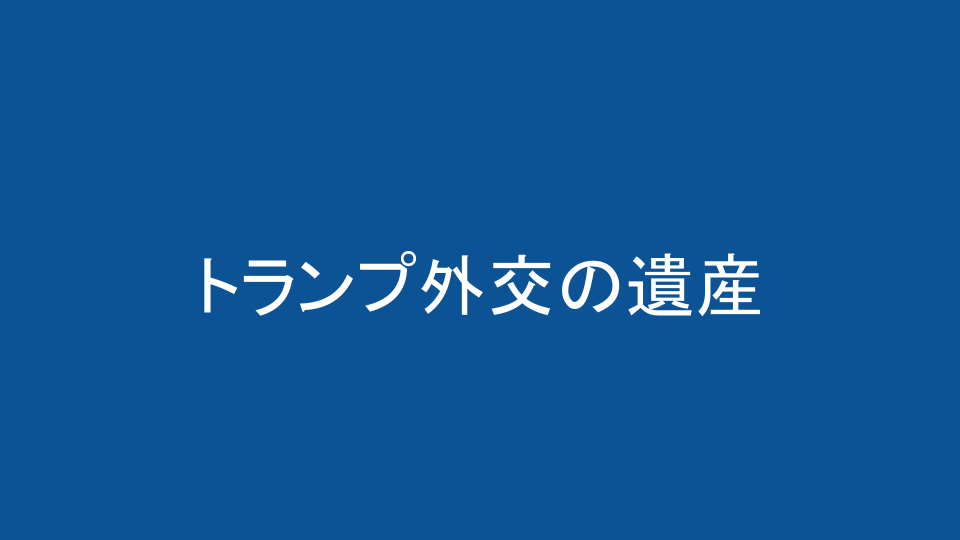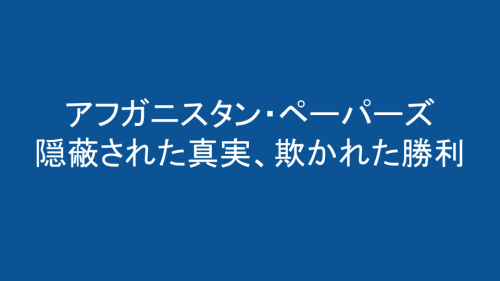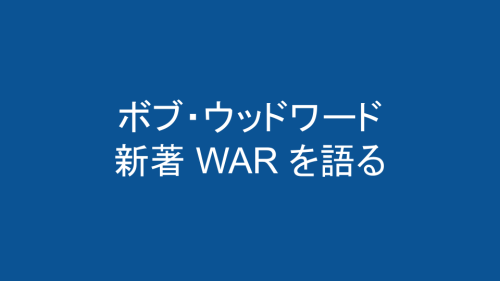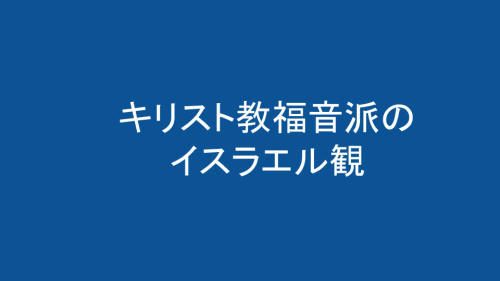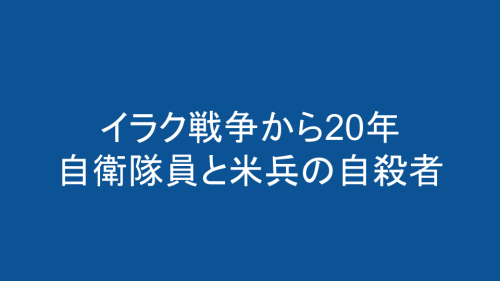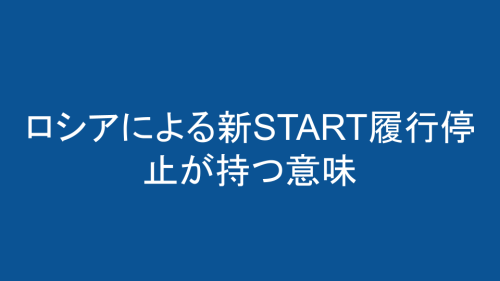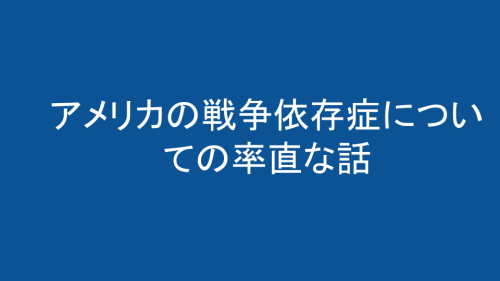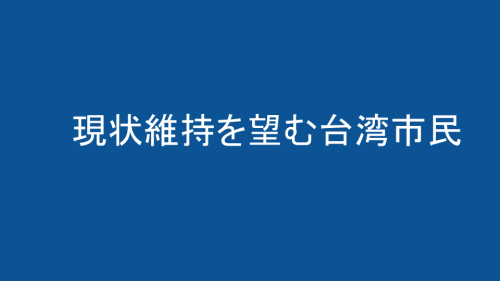米PBS NewsHour (2020年12月31日)で、アンカーのジュディ・ウッドロフが、トランプ外交4年間の遺産とバイデン次期大統領が直面する外交政策の課題について、4人の専門家に聞いています。
動画:Trump’s legacy on foreign policy, and the challenges facing Biden Dec 31, 2020 PBS NewsHour(こちら)
トランプ外交の遺産と次期バイデン政権の課題:専門家による議論の概要
番組の出席者
サマンサ・ヴィノグラド:ブッシュ政権およびオバマ政権で国家安全保障部門に従事。現在、デラウェア大学バイデン研究所上級アドバイザー
レベッカ・ハインリクス:連邦議会の下院軍事委員会のスタッフとして勤務。現在、ハドソン研究所の上級研究員
チャールズ・カプチャン:オバマ政権において国家安全保障会議の大統領特別補佐官。現在、ジョージタウン大学の国際関係論の教授で、外交問題評議会の上級研究員。最新の著書はIsolationism: A History of America’s Efforts to Shield Itself From the World
スーザン・ゴードン:2020年8月まで国家情報副長官。それ以前は主にCIAで勤務
司会:PBSNewsHourのアンカーであるジュディ・ウッドロフ
議論の概要
サマンサ・ヴィノグラドはトランプ外交の遺産を極めて否定的に論じます。彼の外交政策の一貫性の無さ、見せかけ、単独主義を厳しく批判します。
レベッカ・ハインリクスはトランプ外交の遺産を積極的に肯定します。トランプの前任者たちによる行き過ぎたリベラル・インターナショナリズムを修正し、中国との大国間競争を積極的に位置づけたと評価します。
チャールズ・カプチャンは、トランプ外交は米国の歴史に照らして特異なものではないが、これまでの行き過ぎを過剰に修正しようとして失策も招いたと指摘します。
スーザン・ゴードンは、トランプ外交が中国の脅威に対処したことや、中東の安定や北朝鮮の抑止に寄与したことを評価する一方、ロシアやNATOに対する失策、米国のリーダーシップの喪失を指摘します。。
番組での議論のトランスクリプト(日本語訳付き)
以下、議論のトランスクリプトに拙訳を付けて紹介します。
英語を学ばれておられる方は、上記で紹介している動画と併せてリスニングやスピーキングの素材としても役立てていただければと思います。
はじめに:議論の目的と出席者の紹介
Judy Woodruff:
During the early days of the 2016 campaign trail, then candidate Donald Trump assured his supporters that he would pursue an America first approach to foreign policy.
2016年の選挙戦の初期において、当時候補者だったドナルド・トランプは支持者に、外交政策においてアメリカ・ファーストの手法を追求すると断言しました。
But what legacy does President Trump leave behind? What are the main foreign policy challenges facing Joe Biden? And how is America’s role in the world changing?
トランプ大統領はどんな遺産を遺すことになるのでしょうか。また、ジョー・バイデンが直面する主要な外交政策の課題はどんなことでしょうか。そして、世界におけるアメリカの役割はどう変化していくのでしょうか。
To assess all of this, I spoke with four foreign policy experts.
こうしたことを考察するために、4人の外交政策の専門家に聞きました。
Susan Gordon served as principal deputy director of national intelligence until August of last year. She spent most of her career before that at the CIA.
スーザン・ゴードンさんは、昨年8月まで国家情報副長官を務めていました。それ以前は主にCIAで勤務していました。
Charles Kupchan was special assistant to the president on the National Security Council during the Obama administration. He’s now a professor of international affairs at Georgetown University and senior fellow at the Council on Foreign Relations. His latest book is “Isolationism: A History of America’s Efforts to Shield Itself From the World.”
チャールズ・カプチャンさんは、オバマ政権において国家安全保障会議での大統領特別補佐官でした。現在はジョージタウン大学の国際関係論の教授で、外交問題評議会の上級研究員です。最新の著書はIsolationism: A History of America’s Efforts to Shield Itself From the World(孤立主義:自らを世界から遮断するアメリカの試みの歴史)です。
Rebeccah Heinrichs, senior fellow at the Hudson Institute, she also served on Capitol Hill on the House Armed Services Committee staff.
レベッカ・ハインリクスさんは、ハドソン研究所の上級研究員で、連邦議会の下院軍事委員会のスタッフとして務めていました。
And Sam Vinograd has served in the Bush and Obama administration in several national security roles, including senior adviser to the national security adviser. She’s now a senior adviser at the University of Delaware’s Biden Institute.
サム・ヴィノグラドさんは、ブッシュおよびオバマ政権で国家安全保障部門において勤務してきました。その経歴には、国家安全保障問題担当大統領補佐官の上級アドバイザーの職も含まれます。現在はデラウェア大学バイデン研究所の上級アドバイザーです。
And we welcome all of you back to the “NewsHour.” Thank you very much for joining us.
皆さん、NewsHour に再び出演していただきありがとうございます。参加いただいたことに感謝申し上げます。
サマンサ・ヴィノグラド(1回目の発言):一貫性の無さ、見せかけ、単独主義
Judy Woodruff:
Sam Vinograd, I’m going to start with you with a pretty simple question. What is the legacy of President Trump and his foreign policy?
まずは、サム・ヴィノグラドさんへのとてもシンプルな質問から始めたいと思います。トランプ大統領と彼の外交政策の遺産は何だとお考えですか。
Samantha Vinograd:
Judy, I think that President Trump’s foreign policy legacy is really defined by a historic level of systemic incoherence, hypocrisy, as well as a unilateralism across the board.
ジュディさん、トランプ大統領の外交政策の遺産は全体として、かつてないほどの全般的な一貫性の無さ、見せかけの行為、そして単独主義によって定義されると思います。
On the systemic incoherence front, we have seen a historic number of instances in which the foreign policy establishment within the administration pursued a bifurcated foreign policy. We had the national security apparatus going one way, and then President Trump going the other. That was confusing to everyone abroad, as well as here at home.
体系的な一貫性の無さに関して言えば、政権内の外交政策組織が二つに分岐した外交政策を志向するこれまでにない数々の事例を見てきました。国家安全保障組織がある方向に向かう一方、トランプ大統領は別の道を行きました。そのことにより、国内はもとより海外においても混乱を招きました。
Second, we had the president and his national security team inconsistently apply international rules and U.S. values. People that President Trump found to be politically expedient were treated one way, and everyone else was treated another.
加えて、大統領と国家安全保障チームは国際的なルールや米国の価値観を一貫性なく適用しました。トランプ大統領にとって政治的に都合のよい人々が処遇される一方で、他の者たちは別の扱いを受けました。
In terms of the hypocrisy, we saw individuals like Secretary of State Pompeo and others ask foreign leaders to do things that President Trump wasn’t doing here at home. That particularly relates to advancing democratic freedoms, like free and fair elections, freedom of the press, and the freedom to peacefully protest.
見せかけの行為に関して言えば、ポンペイオ国務長官らが、トランプ大統領が国内でとってはいない行動を外国の指導者に対し求めるのを見てきました。それは特に、自由で公正な選挙、報道の自由、平和的に異議を申し立てる自由のような民主的な自由を進展させることに関連するものです。
Overall, that undermined U.S. credibility abroad and undermined the ability of the president’s foreign policy team to execute the policies that they saw fit overseas.
結局は、そうしたことにより、米国の海外での信頼性や、海外で適応すると思われる政策を実行する大統領の外交政策チームの力が損なわれてしまいました。
レベッカ・ハインリクス(1回目の発言):リベラル・インターナショナリズムを修正、大国間競争
Judy Woodruff:
A lot of points there to digest and to think about.
よく考えるべきポイントがたくさん指摘されました。
Rebeccah Heinrichs, what would you say is the president’s legacy?
レベッカ・ハインリクスさんはトランプ大統領の遺産についてどのように考えておられますか。
Rebeccah Heinrichs:
I think President Trump’s rhetoric sometimes could have distracted from a lot of the policy, good, sound policy that came out of his administration.
トランプ大統領の物言いは時として、彼の政権から出される多くの良き政策や穏当な政策から逸脱したかもしれないと思います。
And I think a lot of what he did, this America first, really translated into a correction of the liberal internationalism that was ongoing, not just the Obama administration, but really before him in the Bush administration as well.
実際には、アメリカ・ファーストのもとで彼の行った多くのことは、オバマ政権はもとより、それ以前のブッシュ政権から進行していたリベラル・インターナショナリズムを修正することに転化したと考えます。
And what President Trump’s foreign policy did was it re-established that the United States is not going to remain the world’s preeminent power just by default. We have to fight for it, and that our primary rival is China, and that China, combined with Russia, presents a very formidable challenge to the United States economically, militarily, and so that the United States has to fight for that.
トランプ大統領の外交政策が行ったことは、米国が端から世界に秀でた大国であることはないということを再構築したことでした。米国の最大のライバルは中国であり、中国はロシアと組んで、経済的・軍事的に非常に手ごわい挑戦を米国に突き付けているがゆえに、米国は戦わなければなりません。そうであるからには、米国はそのために戦わなければならないのです。
That became the thing that pushed American foreign policy and really established the United States on much sounder footing, and then also countered Iran very effectively and worked with our Arab allies, which is why you see a lot of these great normalization agreements between Israel and these Arab states, because they were — the Trump administration really created conditions that were conducive to establishing this great — these great accomplishments.
それがアメリカの外交政策を推し進めることになり、実際に米国をよりしっかりとした基盤の上に立たせることになりました。そしてそれはまた、アラブの同盟国と組み、非常に効果的にイランに対抗することになりました。その結果、イスラエルとアラブ諸国の間に多くのすばらしい国交正常化協定の事例が実現しましたし、トランプ政権は実際に、このすばらしい業績を打ち立てることにつながる環境を創り出しました。
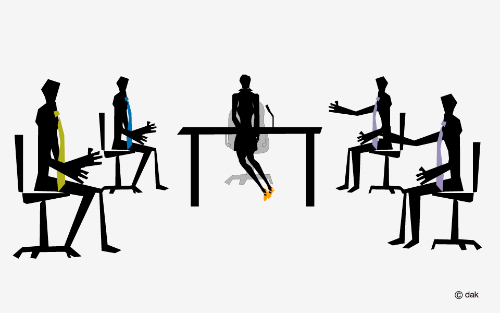
チャールズ・カプチャン(1回目の発言):米国の歴史に照らして特異なものではない、過剰な修正
Judy Woodruff:
Charles Kupchan, pick up on that. And we have heard the word unilateralism.
チャールズ・カプチャンさん、これまでの2人の話を引き継いでくださいますか。また、米国の単独主義についても言及がありました。
You have written, you have said that what we’re seeing now in President Trump may not be so much an outlier, when you compare it to the sweep of America’s foreign policy since the founders.
あなたは著書の中で、今のトランプ大統領の言動を建国の父たち以来のアメリカの外交政策の歴史と比べてそれほど特異なものではないようだと述べていますね。
Charles Kupchan:
Well, when he said America first in his inaugural address, Trump was really going back to 1940, the America First Committee that formed to keep the U.S. out of World War II.
トランプは就任演説でアメリカ・ファーストと述べたとき、実際に1940年に戻ろうとしていました。米国が第2次世界大戦に参加することを阻むために結成されたアメリカ第一主義委員会のことです。
And although we have lived in an America that’s been very engaged in the world, from 1789, when we began life as a federation, right up until Pearl Harbor, the U.S. tended to shy away from engagement. We were very much connected to the world commercially, but not strategically.
私たちはまさに世界とつながるアメリカに住んでいますが、連邦国家として歩みを始めた1789年から真珠湾攻撃の直前まで、米国は世界とのかかわりを避ける傾向にありました。米国は経済的には世界と大いにつながっていましたが、戦略的にはそうではありませんでした。
That changes in ’41. Then it changes even more after the end of the Cold War and after 9/11.
それが変わったのが1941年でした。冷戦の終結そして9.11の後、その変化はさらに進みました。
And I would agree with what Rebeccah said, that Trump was trying to correct for what I see is overreach, overreach strategically, overreach economically, trade deals that didn’t work for average Americans, overreach perhaps in immigration, where many Americans felt we didn’t have control of our borders.
私はレベッカさんが述べたことに賛成したいと思います。トランプは、私たちが経験しているところの行き過ぎを修正しようと試みました。それは、戦略的な行き過ぎ、経済的な行き過ぎ、平均的なアメリカ国民にとって利益をもたらさない貿易、おそらくは行き過ぎた移民。そうしたところで、多くのアメリカ国民が、境界の統制がとれないと感じていたのです。
Where I think Trump went wrong is, he vastly overcorrected. Instead of pulling back, instead of judiciously trying to correct, he took a wrecking ball to the world America built, the institutions. He pulled out of the Middle East without any real strategy.
しかし、トランプが誤ったのは、過剰に修正しすぎたことでした。思慮深く引き戻して修正をはかるのではなく、アメリカが築いてきた世界と機構に対し解体のための鉄球を投げつけました。彼は現実的な戦略のないままに中東から引き揚げてしまったのです。
So, I think his instincts politically were correct. The American people said, hey, let’s tap on the brakes, let’s pull back from the world a little bit. But he went way too far in the implementation.
彼の政治的直観は正しかったと思います。アメリカ国民は言いました。少しばかりブレーキを踏み、世界から手を引こうじゃないか、と。でも、トランプはそれをやり過ぎてしまったのです。
スーザン・ゴードン(1回目の発言):中国の脅威に対処、中東の安定、北朝鮮の抑止、ロシアやNATOに対する失策、リーダーシップの喪失
Judy Woodruff:
Sue Gordon, it’s a lot to ask you to pull all that together.
スー・ゴードンさん、これまでの多くの議論をまとめていただけますか。
(LAUGHTER)
(笑い)
But, from your perspective, someone who’s worked so closely in the intelligence community for so long, how do you see it?
長期にわたりインテリジェンス・コミュニティの現場に密接に関わってこられたあなたの立場からすれば、どのように理解されますか。
Sue Gordon:
So, I think Sam, Rebeccah and Charles all made great points.
サム、レベッカ、チャールズさん共に的を射る発言であったと思います。
One, I think history is going to decide what his legacy is. And President Biden is going to have a lot to say about it. I put his actions in three bins. I think there’s some good. Clearly, the national security work he did to highlight the threat that China posed is going to be one of his greatest legacies.
1つには、トランプの遺産については歴史が決めることになるでしょう。バイデン次期大統領はそれについて多くのことを語ることになるでしょう。私はトランプの行動を3つの領域に分けて考えています。1つには良い面があったということです。確かに言えることは、国家の安全保障に関わって中国がもたらす脅威に焦点をあてたトランプの仕事は、彼のすばらしい遺産の1つになるということです。
I think you have to say that the Middle East, despite the lack of orthodoxy, is a more peaceful place than it was when he took office. Certainly, the Islamic caliphate has been tamped down.
正統性に欠けはしますが、中東については彼が大統領に就任した時点よりもより平和的な場所になったことはまちがいありません。確かにイスラム国は抑え込まれました。
And I think North Korea, even though you could give it a neutral grade, you do have to admit that there has been in the last three years no nuclear tests of any weapons. So, I think there’s some good there.
また、北朝鮮についての評価は難しいかもしれませんが、この3年間、核兵器についての実験が行われていないことを認めなければなりません。したがって、北朝鮮への対処についても良い面があったと思います。
I also think there’s some massive failures. I think his work on Russia, Russia is more brazen. The cyberattack shows it. NATO, even though you’re seeing more European contribution, you have almost broken the spirit of it, whether it’s going to come along. Alliances that are so necessary have been really broken.
大失策もまたあると思います。ロシアについての仕事がそうです。ロシアは厚かましさが増しています。サイバー攻撃がそのことを示しています。NATO については、ヨーロッパ諸国の負担金の増加について関心があるかもしれませんが、NATO がうまく機能するかどうか、その機構の主旨はほとんど崩れています。とても重要な同盟が現実に壊れてしまっているのです。
So, I think you have a lot of viewers so I think you have a mixed bag, but the Biden administration is going to kind of have to come in, and its actions will dictate whether the gains will be maintained or whether the loss of leadership is going to be just devastating.
多くの見方があり、それらが寄せ集まっています。バイデン政権はいわば、そうした中に入っていかなければなりませんし、その行動によって、トランプ政権が得てきたものを維持するのか、それとも、トランプ政権によるリーダーシップの喪失がまさに壊滅的なものを導くことになるのかが決められていくでしょう。
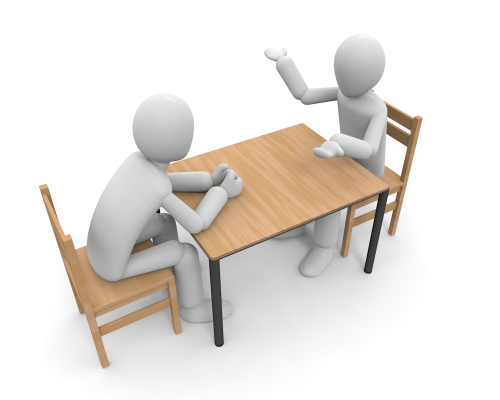
サマンサ・ヴィノグラド(2回目の発言):トランプは彼と米国の利益に同盟国を引き込もうとした
Judy Woodruff:
And, Sam Vinograd, I’m thinking back to what you said.
サム・ヴィノグラドさん、あなたが述べたことについてあらためて考えてみたいのですが。
And what we’re hearing from our other panelists is that there is a rationale for at least some of what President Trump has been doing. What about that? And what about whether one can look at this as an attempt to pull back from what had been an overreach?
他のパネリストからの発言を伺うと、少なくともトランプが行ってきたことのいくつかには論拠があるということになります。それについてどう思いますか。また、米国の行き過ぎた行動を引き戻す試みとしてこれを見ることができるかどうかという点についてどう考えていますか。
Samantha Vinograd:
Well, I think that President Trump certainly felt that there needed to be a review of existing U.S. commitments around the world.
世界において米国の現行の関与のあり方の見直しが必要であるということについては、トランプ大統領が確かに感じていたことだと思います。
We saw that with respect to alliances like NATO, Germany and South Korea, in which President Trump tried to review the funding commitments that the United States made, in light of what our partners were putting forward. We saw President Trump review our commitment to key multilateral institutions, including the U.N. itself, as well as various entities within the United Nations.
NATO、ドイツ、韓国などとの同盟に関しては、トランプ大統領は、米国の資金拠出のあり方についてパートナーがどのような提案をしてくるのかという観点で見直そうとしました。また、トランプ大統領は、国連や国連のさまざまな組織のような多国間の機構への米国の関与についても見直しました。
It appeared to be that he was trying to cut overall U.S. funding to these entities. He was successful in some regards. NATO allies have increased their contributions to the NATO budget.
大統領はこれらの機構への米国の資金拠出を全面的に削減しようとしました。大統領はある面でそれに成功しました。NATO諸国はNATOの予算への拠出を増加させました。
But, overall, President Trump seemed to be pursuing policies that he viewed as benefiting him or benefiting the United States, and acting alone, and trying to pull other countries in with him after the fact. I think that approach was dangerous.
しかし、トランプ大統領は彼にとって、あるいは米国にとって利益になると見られる政策を追求し、単独で行動し、事実を作って彼の側に他の国を引き込もうとしているようでした。そうした手法は危険です。
Our alliances are built around coordination, cooperation and discussion. And I don’t think that our allies appreciated being told what they had to do.
同盟は、調整、協力、議論によって築くものです。米国の同盟国が、何をすべきかを告げられたことを歓迎したとは思えません。
President-elect Biden is going to have to contend with pursuing his affirmative foreign policy goals, while reacting to President Trump’s somewhat instinctual desire to focus within our borders. So, we could see president-elect Biden try to undo some of what President Trump did with respect to our commitments abroad.
バイデン次期大統領は、米国の境界内に注力するトランプ大統領のいくらか直感的な願望に応答する一方で、積極的な外交政策の目標を追求することを主張する必要があります。したがって、バイデン次期大統領は海外での米国の関与に関し、トランプ大統領が行ってきたことのいくつかを取り消すよう試みることになると思います。
レベッカ・ハインリクス(2回目の発言):中国が米国の地政学的ライバルであることを明確化
Judy Woodruff:
Rebeccah Heinrichs. I would like to turn to what the challenges are that lie ahead for president-elect Biden.
レベッカ・ハインリクスさん、バイデン次期大統領に向けられた課題についてお聞きしたいのですが。
Based on what you’re all saying in your own ways, what should President Biden’s priorities be? Where should his focus, his main focus be?
あなたのお考えでは、何がバイデンの優先課題であると思われますか。どこに主要な焦点が置かれるべきでしょうか。
Rebeccah Heinrichs:
I think President Trump’s administration really laid bare, if it wasn’t clear before, that China is the number one geopolitical rival for the United States. It will be for our generation.
以前には明らかでなかったかもしれませんが、中国が米国にとって地政学的な第1のライバルであることをトランプ大統領の政権がはっきりとさせました。それがこれからの時代です。
We have to understand that China is contesting the United States militarily in the Western Pacific economically and diplomatically, and that the United States needs to fight for American preeminence and with our allies and partners to deter Chinese aggression, certainly against Taiwan, but then also be prepared to fight and win a military contest, if deterrence fails.
我々が理解すべきことは次のことです。中国が西太平洋で軍事的・経済的・外交的に米国に対抗していること、そして米国はアメリカの優位性と台湾に対する行動が明らかなように中国の過激化する行動を阻むために我々の同盟国やパートナーと共に戦う必要があるということ、そして、抑止力が働かない場合には、軍事衝突の戦いに勝利するための備えをする必要があるということです。
There are a variety of other ways and fronts in which the United States needs to shore up our sovereignty, our industrial base, our technological edge vs. China. And I am afraid that, mainly because some of the signaling coming out of the president-elect Biden’s appointments, especially John Kerry’s appointment to lead this climate change envoy, that climate change could be the driving force vs. China, and that China then therefore might take a sort of a backseat on these other issues.
米国には、主権、産業基盤、先端科学技術において、中国に対峙し打ち勝つ必要のあるさまざまな分野が存在します。私が懸念を抱いているのは主に、バイデン次期大統領が任命した閣僚らから見えてくること、特に、気候変動の特命使節を率いるジョン・ケリーの任命に懸念があります。気候変動は対中国の交渉カードになるはずのものですが、それと引き換えに、中国は他のこれらの課題において背後で影響力を得る可能性があります。
That would be a grave mistake.
それは重大な過ちを犯すことになると思います。
The last point I would make is, President Trump got into a lot of — he was criticized heavily for a lot of the things that he said and did against our allies and some institutions he pulled out of and arms control deals he pulled out of.
最後に述べたいのは、トランプ大統領が関わった多くの事柄について、つまり、彼は、同盟国や、彼が引き揚げた国際機構や軍備管理に対する言動で大変な批判を受けました。
Many of those things were right, though, and long overdue. And he made a lot of good points about our allies and partners needing to invest in their militaries to help the free world defend against these autocratic regimes.
しかしながら、多くの事柄は正しく、もっと以前に為されるべきことだったのです。彼は、独裁体制から自由な世界を守るために軍事に投資する必要のある同盟国とパートナーに関して多くの良いことを為したのです。
And so president-elect Biden, when he becomes president, needs to make sure that he doesn’t just go back and try to rejoin these bad deals and agreements that the Russians, et cetera, were cheating on.
ですから、バイデン次期大統領が大統領に就任する時には、ロシアなどが不正を行っている良くない案件や合意へと引き返したり復帰したりすることだけはしないようにすべきです。
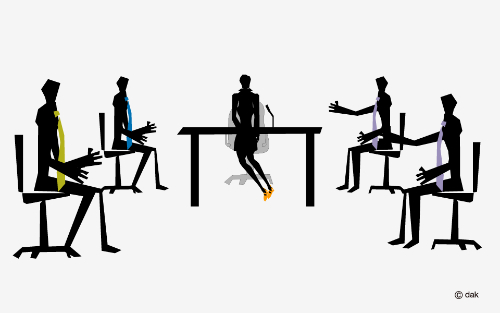
チャールズ・カプチャン(2回目の発言):単独主義からチーム・プレイヤーに
Judy Woodruff:
Charlie Kupchan, do you think there’s a chance that that’s what Joe Biden is going to do?
チャーリー・カプチャンさん、それが(=単独主義を修正するということが)、ジョー・バイデンが行うことであるというのは十分にあり得ることでしょうか。
I know you have told us that you think one of — the first thing that’s going to happen is the unilateralism that was a — such a feature of the Trump presidency is going to go away quickly.
「それ」というのは、バイデン政権において最初に起こることが、トランプ大統領の特徴であった単独主義がすぐにも消え去るであろうとあなたが考え、語ってきたところのことです。
Charles Kupchan:
Yes, I think the most destructive part of Trump’s foreign policy has been the unilateralism, pulling out of pacts, isolating the United States from its key allies, pulling out of the World Health Organization in the middle of the greatest pandemic since 1918.
そうですね。トランプの外交政策の最も破壊的な部分は単独主義であったと思います。協定から離脱し、米国を主要な同盟国から疎外させ、1918年以来の大変なパンデミックの最中に世界保健機関から脱退しました。
It just — it didn’t make any sense. So, I think the U.S., on day one of the Biden administration, will go back to being a team player.
これについては理解できません。バイデン政権の発足と共に米国はチーム・プレイヤーに戻ると思います。
Another big change is that democracy will be back. Joe Biden will restore a sense of liberal democracy, of republican values to the country. We still have a sitting president who has yet to admit that he just lost the election. Most of the world is staring at us with amazement.
もう1つの大きな変化は民主主義が回復するであろうということです。ジョー・バイデンは米国の共和制の価値観である自由民主主義を回復させるでしょう。米国は選挙に敗れたことを認めずにいる大統領を未だ抱えています。世界の大半が驚きの目で米国を見ています。
Where I think you will see more continuity than change is continued pullback from the Middle East, because Democrats and Republicans alike agree it’s time to end the forever wars, standing up to China, as Rebeccah was saying, particularly on the trade front.
変化よりも継続が見られるのは中東からの継続的な撤退でしょう。民主党員も共和党員も同様に終わりなき戦争を終わらせる時であると考えています。そうして、レベッカさんが述べたように中国と、とりわけ貿易の面で対峙するのです。
And I also think you’re going to see Biden focus heavily on trying to make the case that American foreign policy works for average Americans. That probably means more money on things like cyber, on things like global health, on things like climate change, probably less on defense spending, and also more investment in America’s middle class, making sure that our trade agreements work not just for big corporations, but also for working Americans.
バイデンが、アメリカの外交政策が平均的なアメリカ国民の利益となるよう大いに力を注ぐであろうとも思っています。それはおそらく、防衛費への資金よりも、サイバー空間、世界的な健康医療、気候変動といったことにより多くの資金があてられることになるでしょう。そしてまた、アメリカのミドルクラスへの投資を図ることにより、貿易協定が単に大企業だけでなく、働くアメリカ国民のためにも機能するものになるでしょう。
スーザン・ゴードン(2回目の発言):民主主義への支持、信頼と真実への投資、安全保障の再構築
Judy Woodruff:
And, Sue Gordon, you touched on some of these things in your remarks a moment ago.
スー・ゴードンさん、先程のあなたの意見でいくつかの点については既に触れられたことではあるのですが。
But bring us, finally, back to this question of America’s role in the world. And to what extent does — should Joe Biden have a fixed idea in his own mind of what America’s role is in 2021 and in coming years?
最後に、世界でのアメリカの役割についてお尋ねしたいのです。2021年とそれ以降のアメリカの役割について、バイデンは自身の心のうちにどの程度、断固とした考えを持ち、また持つべきなのでしょうか。
Sue Gordon:
So, I think the first thing that I hope the president-elect realizes is, this is a changed world. There is no going back to before 2016.
次期大統領に理解して欲しいことの第1は、世界は変化したということです。2016年以前に戻ることはありません。
If I were to say three things, it would be, number one, there are few in the world that can offer the leadership in these disruptive times than the United States can. So, figuring out our leadership role, our value proposition, our support for democracies is one.
3つのことを言わせていただけるなら、1つには、この破壊的な時において、世界には米国以外にリーダーシップを発揮できる国はないということです。リーダーシップの役割と提案できる価値観について答えを探すとすれば、それは民主主義への支持です。
The second is, invest in trust and truth. That goes all the way from trusted technologies to keeping your word. There is so much untruth that is governing what we do.
2つめは、信頼と真実への投資です。信頼できる科学技術から約束を守ることに至るまで、すべてにわたる投資です。あまりにも多くの虚偽が我々の行動を支配する現状があるのです。
And the third is, I really do believe, in the midst of COVID and the economy and climate and societal unrest, there has to be room for national security. There has to be room for rebuilding the institutions that are actually responsible for effecting his policies that have been so distant from the — from President Trump’s policies.
3つめは、コロナウイルス、経済、気候、そして社会の不安の真っただ中において、国の安全保障について考える余地があるはずだということを本当に強く感じています。バイデンの政策を実現するための実際に責任のある機構を作り直す余地があるはずだということです。それは、トランプ大統領の政策とは相当に異なるものになるはずです。
So, just a few of the things. Easy day. I’m sure he’s up to it.
以上、ほんのわずかばかりの提案です。心配はいりません。バイデンならきっと大丈夫ですよ。
(LAUGHTER)
(笑い)
Judy Woodruff:
It’s a full plate, for sure.
大変有意義な時間が持てました。
Well, we want to thank all of you for giving us this important look as we begin this next year.
来年に向けて重要な見通しを与えてくださった皆様全員に感謝します。
Sue Gordon, Charlie Kupchan, Rebeccah Heinrichs, and Sam Vinograd, thank you very much.
スー・ゴードンさん、チャーリー・カプチャンさん、レベッカ・ハインリクスさん、そしてサム・ヴィノグラドさん、どうもありがとうございました。
And, again, our thanks to all four of them.
4人の皆様に重ねて感謝いたします。
おわり
動画:Trump’s legacy on foreign policy, and the challenges facing Biden Dec 31, 2020 PBS NewsHour(こちら)
余談
チャールズ・カプチャンについて
チャールズ・カプチャンについては、当ブログ2020年9月19日付「トランプの単独主義と国連演説およびワシントンの辞任挨拶」で彼の論考の一部を取り上げています。上記の議論での彼の発言とも重なりますので、よろしかったら確認してみてください(こちら)。
カプチャンについてもう1つ。私がワシントンD.C.に留学中に受講した「アメリカの外交政策」のクラスでの課題図書の1つがカプチャンのThe End of the American Era: U.S. Foreign Policy and the Geopolitics of the Twenty-first Century(2002)でした。
その本の内容にわくわくしながら辞書を引きつつ読み進め、担当教授からの指示があったわけでもないのに、自主的にすべての章を要約しました。そして、教授からの評価やコメントを期待してこれを提出しようとしました。
しかし、教授は「私は既にこの本を読んでいるのだから君の要約を読む必要はない」とすげないご返事。相手にしてもらえず、教授のオフィスをすごすごと後にした思い出があります。
レベッカ・ハインリクスについて
レベッカ・ハインリクスは、私がワシントンD.C.に留学中、2018年夏の集中講座で「Nuclear Deterrence and Arms Control」(核抑止と軍備管理)を受講した際の担当の先生でした。
講座の目的は「This course challenges students to consider the purpose of U.S. nuclear weapons and the role they play in U.S. security policy.」(この講座は学生に、米国の核兵器の目的およびそれらが米国の安全保障政策に果たしている役割について検討することを求めるものである)というものでした。
彼女は核抑止の重要性を強調し、核の問題を議論する際には関連する用語や概念をきちんと理解しておくことが大切であると強調しておられました。
また、米国や世界での核廃絶の運動を「現実を踏まえない空論」として厳しく批判していました。15人ほどの受講生(私以外はほとんどがアメリカ人学生であったと記憶しています)の多くが彼女の主張に賛同していたように思います。
私はクラスの中で、「私たち日本人は放射能の恐ろしさをフクシマの事故で改めて思い起こした」と発言したのですが、「それは(核兵器の是非の問題ではなく)原子力発電をめぐるセキュリティの問題です」と一蹴されました。
また、核兵器と軍事産業の関りについての彼女の認識を尋ねたこともあります(米国ではオバマ政権下で戦略核の削減を目指す新STARTの延長がロシアとの間で合意される一方、核兵器の現代化に向けた予算が計上されていました)。
その時は、私の英語がうまく通じなかったためかどうかわかりませんが、「私にはわかりません」という不機嫌そうな一言が返ってきただけでした。
私はそれ以上議論を進める勇気も英会話力もなく、じくじたる思いで残りの授業時間を過ごしたのでした。
